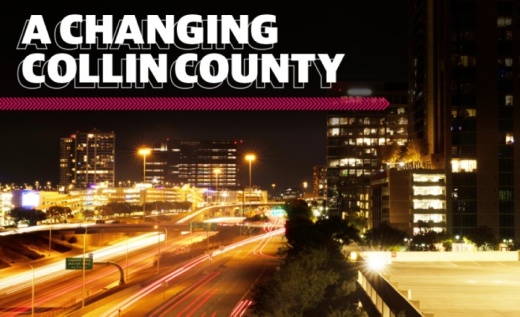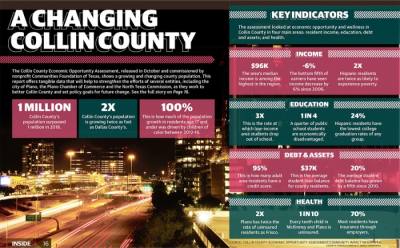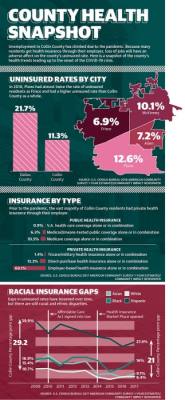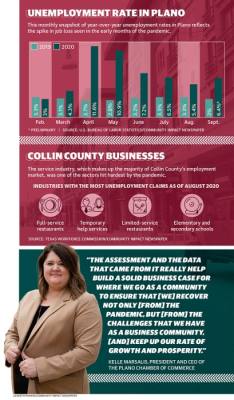The resulting report, released in October, now serves as a baseline for analyzing effects of the pandemic as various Plano and Collin County entities move ahead with their own priorities, CFT Chief Philanthropy Officer Sarah Cotton Nelson said.
The 44-page report, conducted by public policy nonprofit Every Texan, was initially planned for release in April. It outlines data for Collin County on economic status as related to race and ethnicity, income, educational attainment and wealth. The study’s authors used the six-month delay to craft a two-page addendum that gauges the effects of COVID-19 on employment, on job sectors and on health insurance coverage.
The report’s findings reaffirm what cities and organizations on the ground are seeing, Nelson said: disparities in education, health and wealth.
The findings indicate that the pandemic will only continue to widen the need already evident in Collin County, said Ann Beeson, who stepped down as CEO of Every Texan shortly after the report was released.
“We think it’s actually more important than ever to have that baseline data [and] ... see how the county was doing right before this major challenge hit in the county and the world,” Beeson said.
Plano sets eyes on housing
The city of Plano conducted a similar study on housing and economic opportunities within its borders. This effort was conducted within the same time frame as the Collin County report, Plano Neighborhood Services Director Lori Schwarz said.
“A lot of things that [the report] mentioned—as far as the increasing diversity of our communities, the increasing senior population, the widening difference in the low- to moderate-income families and people that are more median income—all of that was in line with what we had also seen in our planning processes,” Schwarz said.
The city’s study guided the development of the Plano Annual Action Plan for fiscal year 2020-21—the first of a larger five-year plan—which creates a roadmap for the city’s use of roughly $10 million from the U.S. Department of Housing and Urban Development.
The Action Plan, which was adopted by council members earlier this year, details possible uses for the first year of funds, including funding for housing rehabilitation, first-time homebuyers, homelessness prevention and affordable housing expansion, among other projects.
Many of the recent efforts by Plano Neighborhood Services have been directly related to the coronavirus pandemic, Schwarz said.
Existing assistance programs saw an increase in need in the last six to eight months of the pandemic, she said. The city assisted by actively disbursing funds for one of those programs: Collin CARES. Officials worked in conjunction with city leadership in Frisco, McKinney and Allen to help with emergency housing and living assistance.
Providing for small businesses
Collin County has been uniquely affected by the pandemic because of the prevalence of small businesses in the county—there were more than 20,000 with less than 20 employees in 2018—specifically in the hospitality, retail and dining industries, the report shows. These businesses have been hit the hardest, with high unemployment numbers persisting through the last half of the year.
In the immediate aftermath of the pandemic, the Plano Chamber of Commerce’s role has been to help connect those businesses with solutions, including assistance programs, President and CEO Kelle Marsalis said.
“We’re so identifiable as a location for corporate headquarters, but the real heartbeat of Plano is our small-business community,” Marsalis said. “That’s one of the areas that [the pandemic] has highlighted, is that small businesses are struggling.”
A more constant, long-term goal of the chamber is advocating for those owners and businesses at the state level.
This includes standing behind legislation that creates change for small businesses, Marsalis said.
“The assessment and the data that came from it really help build a solid business case for where we go as a community to ensure that [we] recover not only [from] the pandemic, but [from] the challenges that we have as a business community, [and] keep up our rate of growth and prosperity,” Marsalis said.
Advocating for the region
Based on the findings of the report, Every Texan recommends Collin County work toward four policy goals: expanded access to affordable health care; a strengthened pipeline from education to the workforce; more support for at-risk households; and increased access to housing and transportation. Change in these areas can help lessen the barriers for socioeconomic mobility among residents, Beeson said.
The policies outlined for Collin County are in line with the legislative priorities for the North Texas Commission, which covers the entire 13-county region, President and CEO Chris Wallace said.
Among the top issues is the expansion of affordable health care, a move that could greatly benefit the region from an economic standpoint, Wallace said. Plano’s insured rate was ranked highest among Collin County cities in 2018, according to the economic assessment.
“Making sure that the million-plus Texans that are uninsured are protected, that they become insured: ... [That] has to be a top issue of the next session,” Wallace said.
The 87th legislative session, which begins Jan. 12, 2021, was meant to see higher education funding be placed at the top of the discussion docket, according to Wallace. But that issue will likely take a back seat to pressing issues related to COVID-19 and economic recovery, he said.
The North Texas Commission will advocate for maintaining funding for public schools through House Bill 3, which was passed in the last legislative session to help strengthen the education-to-work pipeline, Wallace said.
“[The] No. 1 issue is, ‘Do we have the skilled workers to take the jobs that employers need now and in the future?’” Wallace said. “And I think ... HB 3 and maintaining formula funding from [the 86th session] and not going backwards is going to help.”
Communities Foundation of Texas officials said they hope their report will be a catalyst for local organizations to respond to and address changing community needs. Every Texan agreed that now is the time to focus on this baseline data.
“There’s definitely good news and data [in the report] that [Collin County] can be proud of. ... But the pandemic and recession could increase the many barriers that are limiting upward mobility for some residents,” Beeson said.
The city of Plano remains tuned in to conversations at the state level, Schwarz said, but is concentrating its efforts on what will most help Plano residents. Right now, that means focusing on those in danger of losing stable housing; preventing that loss allows for personal economic recovery, she said.
“It’s always a lot easier to prevent somebody from becoming homeless than it is to take the steps to get them back into a stable home,” Schwarz said.








